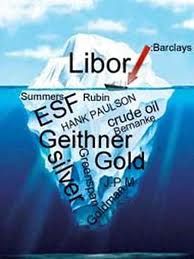Cross posted from The Stars Hollow Gazette
The new Attorney General Loretta Lynch proves why she should not have been confirmed, as she rubber stamps the same weak polices of her predecessor Eric Holder regarding the prosecution of the “Too Big to Jail” bankers.
By Ben Protess and Ben Corkery, The New York Times
Adding another entry to Wall Street’s growing rap sheet, five big banks have agreed to pay about $5.6 billion and plead guilty to multiple crimes related to manipulating foreign currencies and interest rates, federal and state authorities announced on Wednesday.
The Justice Department forced four of the banks – Citigroup, JPMorgan Chase, Barclays and the Royal Bank of Scotland – to plead guilty to antitrust violations in the foreign exchange market as part of a scheme that padded the banks’ profits and enriched the traders who carried out the plot. The traders were supposed to be competitors, but much like companies that rigged the price of vitamins and automotive parts, they colluded to manipulate the largest and yet least regulated market in the financial world, where some $5 trillion changes hands every day, prosecutors said. [..]
A fifth bank, UBS, will also plead guilty on Wednesday to manipulating the London Interbank Offered Rate, or Libor, a benchmark rate that underpins the cost of trillions of dollars in credit cards and other loans. Federal prosecutors had previously agreed not to prosecute the Swiss bank over the Libor scheme. But in a rare stand against corporate recidivism, the Justice Department voided that non-prosecution agreement after learning that UBS was also taking part in the effort to manipulate currency prices.
The guilty pleas, which the banks are expected to enter in federal court in Connecticut on Wednesday, represent a first in a financial industry that has been dogged by numerous scandals and investigations since the 2008 financial crisis. Until now, banks have either had their biggest banking units or small subsidiaries plead guilty. But with the four banks charged with currency violations, the guilty pleas will come from their parent companies. [..]
For the banks, though, life as a felon is likely to carry more symbolic shame than practical problems. Although they could be technically barred by American regulators from managing mutual funds or corporate pension plans or perform certain other securities activities, the banks have obtained waivers from the Securities and Exchange Commission that will allow them to conduct business as usual. In fact, the cases were not announced until after the S.E.C. had time to act.
Senator Elizabeth Warren (D-MA) and Wall Street watchdog group Better Markets weighed in on the lack of any criminal prosecutions:
Better Markets called it a “slap on the wrist” and Sen. Elizabeth Warren (D-Mass.) said in an e-mail: “That’s not accountability for Wall Street. It’s business as usual, and it stinks.” [..]
Dennis Kelleher, president of Better Markets, a non-profit group, said that the Justice Department had not done enough, saying “it talks tough, but winks at Wall Street’s too-big-to-fail banks’ criminal conduct, structuring sweetheart deals to minimize the impact on the criminals.”
Kelleher said the fines alone wouldn’t deter future criminal acts and that the Justice Department should punish bank executives and their supervisors for bad behavior. “Banks don’t commit crimes, bankers do,” he said.
Warren said “the big banks have been caught red-handed conspiring to manipulate financial markets, and several have even admitted in court that they’re felons – but not a single trader is being held individually accountable, and regulators are stumbling over themselves to exempt the banks from the legally required consequences of their criminal behavior.”
At Esquire Politics, Charles Pierce is not impressed by Ms. Lynch:
What a fake. What a fraud. What an insult to any stick-up kid doing five-to-fifteen for robbing a bodega. The banks don’t even have to look between the cushions on the sofa for the loose change they’ll use to pay the fines. They get to use their stockholders’ money to pay the fine. [..]
This is altogether remarkable. Here we have a staggering series of crimes that did very real damage to thousands of people all over the world. Here we have a staggering series of crimes, but not a single identifiable criminal. Who rigged the markets? The bank buildings? A shadowy cabal of ledgers? Motorcycle gangs made up of quarterly reports? This is the only area of criminal justice where law-enforcement actively avoids identifying anyone as a criminal.
Let us face facts. Within these institutions, there have to be hundreds of people who were involved in some way with a scam this large. There were people who supervised those hundreds of people, and people who supervised them. Somewhere, in that mass of criminal activity, I’m willing to bet something substantial that a human being committed an actual crime.
But, no. “The banks” get fined. This is just too freaking hilarious.
After all this evidence and investigation, not one person has been arrested. Sure some were fired at insistence of some regulators, but never criminally charged. So, the crooks are still getting away with breaking the law. Fines are a joke. Most of these banks will recoup those fines in less than a day and, at the end of the year, deduct them as business losses, so the tax payer once again foots the bill. I would hardly call that a victory. It’s a joke.

